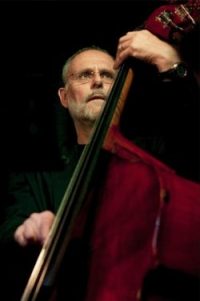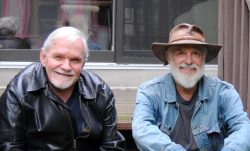Howlin’ Wolf (Chester Arthur Burnett, 1910-1976) was born in abject poverty in White Station, Mississippi, a tiny railroad station. When his parents separated, his mother, a religious fanatic, sent him to be raised by his great-uncle Will Young, a preacher, who beat the boy mercilessly. When he was 13, he ran away and joined his father on a plantation in Ruleville, Mississippi, in the Delta. There he learned guitar from local bluesman Charlie Patton and harmonica from Sonny Boy Williamson.
In 1951, Wolf came into Sun Studios in Memphis, to audition for the great Sam Phillips, the man responsible for launching the careers of Elvis Presley, Johnny Cash, Jerry Lee Lewis, Carl Perkins and many others. Phillips recalls seeing Wolf for the first time, a 6 ‘ 3”, 275 pound giant coming out of the fields in his overalls, holes cut out in the sides of his size 16 boots to accommodate his corns. When he heard him sing, Phillips said “This is where the soul of man never dies.” The first song Wolf recorded for Sun, “How Many More Years”, became a big hit on the R&B charts and a bidding war for Wolf’s services followed, won by the Chess brothers in Chicago. Phillips said that the loss of Wolf was his life’s biggest disappointment, worse than losing Elvis, who Phillips had to sell to RCA records for $35,000 to keep his studio going.
Wolf’s booming voice and imposing stage presence made him one of the most popular blues artists of all time. Several of his songs became blues standards, many of them written by Chess songwriter Willie Dixon. His rough and raw stage personna was in stark contrast to the man himself. Functionally illiterate into his forties, Wolf eventually returned to school to earn a general education diploma and later to study accounting and other business courses to help manage his career. He payed his musicians very well and on time, provided them with health insurance and deducted unemployment insurance ans Social Security – a practice unheard of at that time.
Wolf met his wife, Lillie, when she attended one of his performances at a Chicago club. According to those who knew them, the couple remained deeply in love all their life. Together they raised Bettye and Barbara, Lillie’s daughters from an earlier relationship.
Wolf tried to reconnect with his mother all his life. At the peak of his success, he saw his mother in Mississippi but she rebuffed him. She refused to take the money he offered her, saying it was from his playing the “devil’s music”. Hubert Sumlin, his guitarist and friend, said Wolf cried all the way back to Chicago.
Wolf’s health began declining in the late 1960s. He had several heart attacks and suffered bruised kidneys in a car accident in 1970. Wolf had kidney surgery and died of complications from the procedure on January 10, 1976, at the age of 65.
Howlin’ Wolf probably influenced more artists than any other bluesman, even the great Muddy Waters. To listen to Captain Beefheart, Joe Cocker, Freddie King, or Tom Waits is to hear Wolf. I thought it would be fitting to play “Who’s Been Talking?”, one of my favourite Wolf songs, in the style of Tom Waits.
Richard Séguin – voice, electric guitars, MIDI guitar (tenor and alto saxophones)
Alrick Huenener – upright bass
Roch Tassé – drums
Photo of Alrick by Kate Morgan



Ajouter un mot
You must be logged in to post a comment.